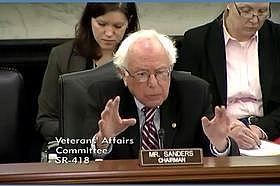At The Crossroads, Part 6: Veterans harder hit by hep C
Kristin Gourlay reported this story for Rhode Island Public Radio as a fellow in the 2014 National Health Journalism Fellowship, a program of the USC Annenberg School for Communication and Journalism. Additional parts to this series can be found here:
At The Crossroads, Part 1: A tale of two epidemics
At The Crossroads, Part 2: Finding hep C infections before it's too late
At The Crossroads, Part 3: As old hepatitis C treatment fades out, new treatments stoke hope
At The Crossroads, Part 4: New hep C drugs promise a cure, for a big price
At The Crossroads, Part 5: The uncomfortable math of hep C treatment

Sen. Bernie Sanders (I-VT) chairs the Senate Committee on Veterans Affairs. At a hearing Wednesday, Dec. 3, Sanders wanted to know why new hepatitis C drugs cost so much and how the VA was going to pay for them. Credit Screenshot of live stream of hearing
In our ongoing series about hepatitis C, we look now at one of the hardest hit populations: veterans. Hep C is three times more prevalent among vets than in the general population. The Veterans Health Administration has the country’s largest hepatitis C screening and treatment program in the country. But that program is struggling to pay for new treatments – and the rising number of veterans who need them.
------
Dennis was a young Marine training at Camp Pendleton, ready to deploy.
“I was on my way over, I was in what they call staging,” said Dennis. “13, 16, 17 days, then send you over to Okinawa, then Vietnam. I got lucky.”
That is, if you call blowing a knee out lucky. It saved him from going to Vietnam. Soon after that, Dennis isn’t sure when or how, he got infected with the hepatitis C virus.
“I didn’t do any intravenous drugs or anything like that,” Dennis said. “My ex had it, I don’t know if I got it from her.”
Dennis is 63. He’s from Providence. He doesn’t want us to use his last name because of the stigma hepatitis C can carry. It’s a disease he’s been living with for decades. That’s partly because, until this year, his treatment options were pretty grim. But the years of hoping for something better to come along are over. Doctor Alexis Pappas gives Dennis the good news in an exam room at the Providence VA.
“So as you’ve probably heard in the news,” Pappas explained, “there’s a lot of new treatments for hepatitis c and the VA has all those available now for your genotype.”
Pappas tells Dennis she’ll start him on treatment right away. And chances are excellent that after 12 weeks he’ll be cured. But that cure comes at a price. One new hepatitis C drug, Sovaldi, costs $84,000 dollars for a full course. The VA managed to negotiate that down to about $50,000 dollars. But with more than 170,000 veterans living with hepatitis C, the price is still too high for strained budgets. And, says Dr. Kittichai Promrat, the timing couldn’t be worse. Promrat oversees the liver clinic at the Providence VA. He also teaches at Brown University’s medical school.
“So most of our veterans have been carrying disease for the past three, four decades,” said Promrat. “And now it’s the time when the full-blown manifestations of chronic liver injury come to light. And we’re now dealing with that, right now.”
Dealing, he says, with a ten-fold increase in the number of patients with liver cancer. Rising numbers of patients needing liver transplants. More veterans with cirrhosis and liver failure. All consequences of untreated hepatitis C.
Promrat says the VA tried to limit access to these expensive new drugs at first. But he says those restrictions were quickly lifted. And the VA is leading the way in screening patients for the disease with a system that’s lacking in most private doctors’ offices. Promrat sees an opportunity.
“I think this is really the very unique moment in time in the entire hepatitis C history,” said Promrat. “And we can really make a significant impact now, going forward, with the new medications that we can really eradicate hepatitis C in hopefully most of our patients.”
To do that, the VA will need billions more dollars. The agency has already asked for one-point-three billion more to pay for one drug, Sovaldi, for the next two years. On Capitol Hill, Senate Committee on Veterans Affairs chairman Bernie Sanders called a hearing on the matter.
“And if the VA is going to be spending billions of dollars for one drug to treat one illness,” Sanders said at the hearing, “the reality is there is less money available to deal with the many other problems facing the VA.”
Problems like high suicide rates, PTSD, and traumatic injuries. And this is the problem everywhere – not just the VA. Expensive hepatitis C drugs are forcing other health care systems to make tough decisions.
Next in our series “At the Crossroads,” how prisons are grappling with those decisions – and even higher rates of hepatitis C.
